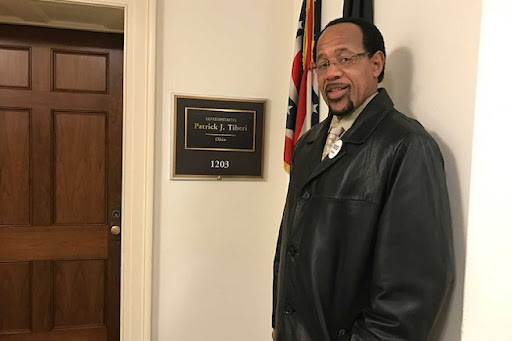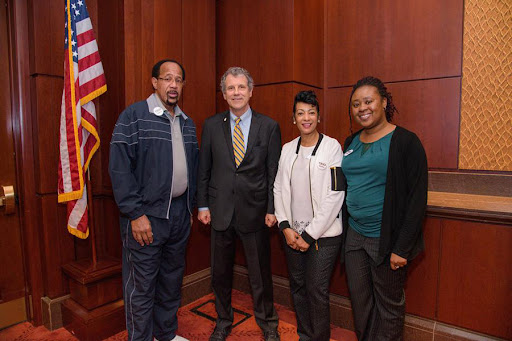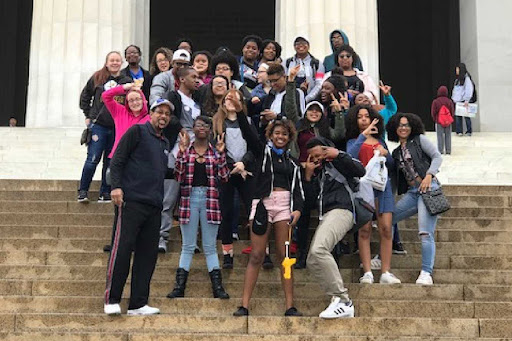
The Roman philosopher Seneca said luck happens when preparation meets opportunity. And Eddie Chambers, Upward Bound program director for 40 years at Wittenberg University, was plenty prepared on March 22 when he landed in Chicago and glanced at his cell phone before making his connecting flight back home to Ohio.
Sometime after takeoff from Washington, D.C., where he had just attended COE’s Annual Policy Seminar, the Department of Education notified him by email that it had rejected Wittenberg’s Upward Bound application for the 2017 fiscal year. Now in its 51st year, the program was preparing again to guide 109 Ohio students from low-income backgrounds to the middle class by becoming the first in their families to earn a college degree.
Chambers read the email repeatedly, thinking it had to be some evil joke. It made no sense; he had applied in November. He stared in disbelief at the message until the cold realization came over him that it wasn’t a joke. The notification further indicated that the Department was not accepting any calls on the matter.
“I was floored, but I didn’t let any grass grow,” Chambers said. He broke out his laptop and, at 11:00 p.m., left email and voicemail messages for the Department’s Senior Education Program Specialist asking for clarification. The program specialist returned the call the following day, and Department personnel pointed out a spacing issue in the Wittenberg program’s budget. Specifically, on two of the 65 pages that Chambers had manually formatted, Chambers set spacing at 1.5 instead of 2.0. Chambers, the Wittenberg provost, and the university’s institutional research program members who had inspected the application were mystified. “You almost had to have a magnifying glass or a ruler to figure that out,” Chambers said.
In a matter of days, Chambers heard that the Department had rejected at least three dozen other Upward Bound applications for formatting and font reasons. “This was a first. I have never, ever seen anything like this,” he said.
So began what Chambers now refers to as “64 days of advocacy” on some days and “64 days of hell” on others. Chambers’ goal was simply for the Department of Education to read and score the application like all others.
Then, as only luck combined with four decades of experience would have it, things fell into place.
Chambers informed his campus stakeholders — the university president, provost, and the financial office — of the rejection. Wittenberg has one of Ohio’s most extensive funded Upward Bound programs, and the program’s 50th anniversary in 2016 had rallied supporters on campus.
Chambers’ staff had already organized a spring break trip for a busload of 34 students to visit Washington D.C. On March 26, they headed to the Capitol to tell Senators Rob Portman and Sherrod Brown what was happening with the program’s application. The meetings went very well, with senators and legislative aides promising support.

Next, the Wittenberg Upward Bound staff turned to the mailing list of 350 program alums they had compiled for the 50th anniversary. They told the alums what was happening to their program and instructed them to write to the Department of Education and their legislators. They offered a sample letter drafted from COE’s policy toolkit. “I wanted to put as much pressure on the Department as possible,” Chambers says.
Soon Chambers began receiving copies of alum letters. Aides for Senators Portman and Brown started receiving phone calls and letters from alums who reported how Upward Bound redirected their lives. One student, who had grown up in a home afflicted by drug addiction, said that Upward Bound’s services intervened in ways that nothing else could have. Because of that intervention, the student was currently teaching college courses and completing his Ph.D. The aides began calling Chambers, telling him about the outpouring of support for the program.
The real turning point came, Chambers said, when alumna Ebony Speaks, a doctor of social work candidate, mentioned the Upward Bound application rejection at social workers’ meeting in Columbus. People there directed her to Congressman Warren Davidson from Ohio’s 8th District. Impressed with her story, Davidson called the Wittenberg interim president and put his legislative aide, Ron Hammond, on the case. “Once Warren Davidson and Ron Hammond got involved, it was a no holds barred type of fight. It was on,” Chambers says. And not a minute too soon: according to Department of Education regulations and policies, TRIO programs were to know their funding status by the first week of May.
Then the timeline went like this:
4/4-4/26: Hammond organized several congressional offices to write to Department of Education Secretary Betsy DeVos, asking her to reconsider the rejected schools.
4/26: A Chronicle of Higher Education story on Upward Bound application rejections prompted a national uproar.
4/27: Secretary DeVos issued a memo saying that rejection over formatting issues wouldn’t happen again. Although this was good news for programs that weren’t seeking new funding, it didn’t help programs that ED had rejected for FY 2017.
4/28: At the urging of TRIO Caucus Co-Chairs Susan Collins (R-ME) and Jon Tester (D-MT), 25 senators wrote to Secretary DeVos asking her to read and score rejected Upward Bound applications.
5/3: More than 30 Members of the House wrote another letter to Secretary DeVos, asking her to read and score rejected Upward Bound applications.
5/5: The FY 2017 omnibus appropriations bill was signed into law, with $50 million additional dollars for TRIO programs. The bill included report language that encouraged ED to provide flexibility to rejected FY 2017 Upward Bound programs by permitting the submission of corrected applications.
5/17: Ron Hammond “throws a Hail Mary” memo to Secretary DeVos, outlining steps the Department could take to avoid legal exposure to reverse the decision and help rejected programs. Congressman Davidson hands it to Secretary DeVos’ staff.
The Wittenberg Upward Bound summer program began June 1, and the Department still hasn’t notified Chambers about its funding. But Eddie’s advocacy campaign had reached its simple goal. On June 6, the Department told Representative Davidson that it is reviewing all the Upward Bound applications that it had rejected for formatting errors.
The situation is ironic, Chambers points out, given the Department’s sensitivity to detail like fonts and spacing errors. “If the shoe had been on the other foot and they wanted us to do something and get them information by 4 p.m. that day, and we failed to do that, the Department would cite us,” he says.
Despite its funding crisis, Wittenberg University has stepped up to ensure its 51-year-old program remains viable to the Springfield community.
Chambers, in the meantime, is set to retire at the end of the summer. Those 64 days of advocacy have exhausted him, but he’s glad he could apply his experience to save the program. “This program means too much to me,” he says. “If we go down, we’re going down kicking and screaming. We’re not going down lightly without putting up a fight.”
